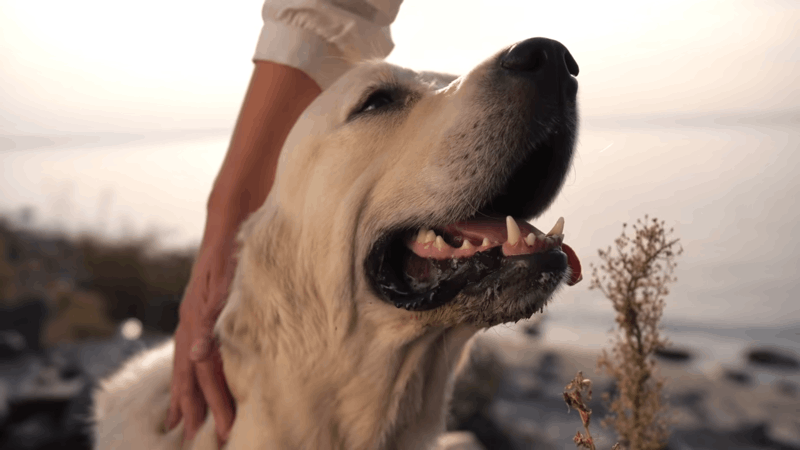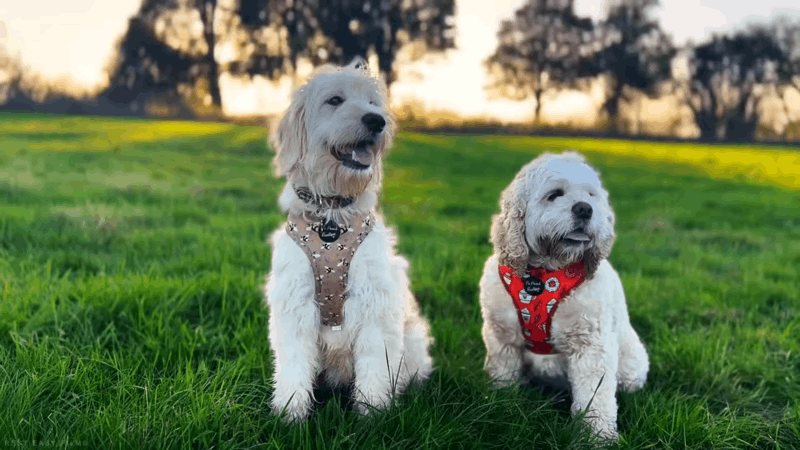No products in the cart.
CBD oil for dogs with collapsed trachea has gained attention as a potential natural remedy to alleviate symptoms and improve their overall well-being. Collapsed trachea in dogs can be a distressing condition, leading pet owners to seek alternative treatments like dog CBD oil.
This blog explores the potential benefits of CBD oil for dogs with collapsed trachea. Discover how CBD oil may offer relief and support for dogs with collapsed trachea, as well as important considerations to keep in mind for their overall well-being.
How Serious is a Collapsed Trachea in Dogs?

A collapsed trachea in dogs is a serious condition that can have significant implications for their overall health and quality of life. The trachea, often known as the windpipe, is in charge of allowing air to enter and exit the lungs. The airflow is obstructed when the trachea collapses, which can cause breathing problems and respiratory distress. For smaller dog breeds that are more prone to this illness, this can be especially worrying.
A collapsed trachea can deteriorate over time and possibly lead to serious consequences like chronic coughing, exercise intolerance, and even respiratory failure if it is not properly treated and managed. If dog owners believe their animal may be suffering from a collapsed trachea, they must act quickly to seek veterinarian care to guarantee proper diagnosis and treatment.
Symptoms of Collapsed Trachea in Dogs
Here are some common symptoms of a collapsed trachea in dogs
- Chronic coughing: Dogs with a collapsed trachea often develop a persistent, honking cough. This cough may worsen with excitement, exercise, or pressure on the trachea, such as from pulling on a leash or wearing a collar.
- Difficulty breathing: Dogs may exhibit rapid or labored breathing, especially during physical activity or in stressful situations. They may also struggle to catch their breath or exhibit wheezing sounds.
- Exercise intolerance: Due to the compromised airway, dogs with a collapsed trachea may have difficulty engaging in exercise or activities that require increased respiratory effort. They may tire quickly or exhibit reluctance to engage in physical exertion.
- Gagging or retching: Some dogs with a collapsed trachea may experience episodes of gagging or retching, which can be triggered by irritation in the throat caused by the collapse.
- Cyanosis: Dogs may display bluish discoloration of the gums or tongue in severe situations where there is a considerable obstruction of the airway, signifying a lack of oxygenation.
These symptoms can potentially be related to other respiratory illnesses, so pet owners should seek veterinary advice in order to receive an accurate diagnosis and the best course of care.
What Causes Collapsed Trachea in Dogs?
There are various reasons that may play a role in the emergence of a collapsed trachea in dogs, albeit the exact cause is not always recognized. These include
- Genetic predisposition: Breeds of dogs like Yorkshire Terriers, Pomeranians, Chihuahuas, and Toy Poodles are more prone to tracheal collapses that are either congenital or inherited. The tracheal cartilage is thought to become weaker and more susceptible to collapsing due to hereditary causes.
- Chronic irritation or inflammation: Chronic respiratory illnesses including bronchitis, tracheobronchitis (sometimes called kennel cough), or infections can keep the tracheal lining inflamed and irritated. Over time, this inflammation can weaken the tracheal cartilage and contribute to its collapse.
- Environmental factors: Chronic tracheal inflammation can result from exposure to environmental irritants such smoking, smog, dust, or chemicals. This chronic irritation can weaken the tracheal cartilage and increase the risk of collapse.
- Age-related changes: As dogs age, the tracheal cartilage can naturally become weaker and more prone to collapse. Older dogs may develop tracheal collapse as a result of the aging process.
- Trauma: Tracheal cartilage degradation can result in collapse if there is physical trauma to the trachea, such as a severe blow or injury.
It’s vital to remember that some variables, and often numerous causes, might lead to the development of a collapsed trachea. An accurate diagnosis and knowledge of the underlying causes of each dog’s ailment require consultation with a veterinarian.
Is Collapsed Trachea in Dogs Fatal?

A collapsed trachea in dogs can be a serious condition, but it is not necessarily fatal in all cases. The outcome largely depends on the severity of the collapse and the promptness of diagnosis and treatment. With proper management, many dogs can live relatively normal lives despite having a collapsed trachea.
Complications, such as persistent respiratory discomfort, recurring respiratory infections, and respiratory failure, can develop in extreme cases or if left untreated. These issues can seriously lower a dog’s quality of life and, in extreme instances, even endanger its life.
In order to provide proper care and enhance the prognosis, it is imperative for dog owners to seek veterinarian care as soon as they fear their pet may have a collapsed trachea.
How to Soothe a Dog With Collapsed Trachea?

It is crucial to seek the advice and proper treatment from a veterinarian when it comes to calming a dog with a collapsed trachea. They can provide a tailored plan to manage the condition, which may include medications, lifestyle adjustments, or surgical intervention.
Seeking professional veterinary care is crucial to ensure the well-being and comfort of the dog with a collapsed trachea.
Dog Tracheal Collapse Home Treatment
Home treatment for dog tracheal collapse is not recommended without proper guidance from a veterinarian. Tracheal collapse is a serious condition that requires professional medical attention. But there are certain general methods that can aid enhance the ease and well-being of a canine with tracheal collapse.
- Weight management: Keeping a healthy weight can ease respiratory symptoms and lessen stress on the airways.
- Minimize stress and excitement: Stress and excitement can exacerbate breathing difficulties. Providing a calm and quiet environment for the dog can help reduce episodes of coughing and respiratory distress.
- Use a harness instead of a collar: Collars can put pressure on the trachea, worsening the symptoms. Switching to a harness can distribute the force more evenly and alleviate strain on the airways.
- Avoid irritants: Reduce your exposure to smoke, dust, chemicals, and other respiratory irritants that can cause or aggravate respiratory symptoms.
- Provide a clean and dust-free environment: To reduce allergens, dust, and other potential irritants that could worsen the respiratory system, regularly clean the dog’s living habitat.
Remember that these are broad recommendations and may not be appropriate in all circumstances. Consulting with a veterinarian is crucial to develop an appropriate treatment plan tailored to the specific needs of the dog with tracheal collapse.
What to Feed Dog with Collapsed Trachea?
There are a few things to consider when feeding a dog with a collapsed trachea to help enhance their comfort and overall health.
- Soft or moist food: Soft or moist food can be advantageous for your dog since it is simpler to swallow and minimizes the danger of choking or tracheal irritation. Wet dog food or adding water to dry kibble to soften it can be helpful options.
- Small, frequent meals: Smaller, more frequent meals can assist prevent excessive swallowing, relieve tracheal pressure, and lessen the risk of regurgitation or vomiting. Splitting the daily food portion into multiple meals throughout the day is recommended.
- Elevated feeding position: Raising your dog’s food and water bowls to an elevated level can make eating and swallowing easier, as it reduces the need for them to lower their head and strain their neck while eating.
- Avoiding irritants and allergens: Some dogs with tracheal collapse may be sensitive to or allergic to particular dietary items. It can be helpful to work with your veterinarian to identify and eliminate any potential food triggers that could aggravate their respiratory symptoms.
It is crucial to remember that these recommendations may differ depending on your dog’s individual demands and condition. Consulting with a veterinarian is crucial to determine the most appropriate diet and feeding plan for your dog with a collapsed trachea. They can provide personalized recommendations based on your dog’s health, dietary requirements, and any underlying conditions.
CBD Oil for Dogs with Collapsed Trachea

CBD oil has gained popularity as a potential supplement for various health conditions in dogs, including collapsed trachea. Some dog owners may consider using CBD oil for dogs with collapsed trachea to alleviate symptoms or provide comfort to their furry friends.
However, before offering CBD oil for dogs with collapsed trachea, contact a veterinarian. They can provide guidance on the appropriate dosage and whether it is suitable for the individual dog’s specific needs. To ensure the safety and efficacy of any treatment, including the use of CBD oil, professional veterinarian advice is required.
The Benefit of CBD Oil for Collapsed Trachea in Dogs
Collapsed trachea is a medical disorder in which the tracheal cartilage rings weaken or lose their integrity, resulting in airway blockage and breathing difficulty. While CBD may have anti-inflammatory and analgesic characteristics that may provide relief, there is a dearth of scientific studies especially focused on the use of CBD oil for dogs with collapsed trachea.
It is essential to speak with a vet who is familiar with this issue if your dog has been diagnosed with a collapsed trachea. Depending on the severity of the disease, they might offer suitable treatment choices like drugs, lifestyle changes, and possibly surgical treatments.
It is significant to remember that CBD oil should only be utilized with a veterinarian’s supervision. They can help determine if CBD oil may be a suitable complementary therapy for your dog’s overall treatment plan. Each dog is unique, and what works for one may not work the same for another. Veterinary guidance is essential in managing a collapsed trachea and determining the best course of action for your dog’s specific needs.
Coconut Oil and CBD Oil for Dogs with Collapsed Trachea: What is Better?
Both oils have different properties and potential benefits, but their effectiveness in treating tracheal collapse specifically has not been extensively studied.
| Aspect | CBD Oil | Coconut Oil |
| Usage and Purpose | The cannabis plant is the source of CBD oil, which has been shown to have potential uses for treating anxiety, pain, and inflammation in dogs. It may have potential effects on relaxation and overall well-being. | Natural oil from coconuts is called coconut oil. It is often used in cooking and has various potential health benefits, such as promoting healthy skin and coat. However, it does not have specific properties for managing tracheal collapse. |
| Effects on Tracheal Collapse | Limited scientific research is available on the specific effects of CBD oil on tracheal collapse in dogs. Its potential benefits for this condition have not been extensively studied. | Coconut oil does not have direct effects on tracheal collapse. It does not address the underlying causes or provide targeted relief for the symptoms of a collapsed trachea. |
| Potential Side Effects | Drowsiness, dry mouth, and changes in appetite are possible side effects of CBD oil in certain canines. It can also interact with certain medications, so caution is advised. | When administered in moderation, coconut oil is typically regarded as safe for dogs. However, excessive consumption can lead to gastrointestinal upset and potential weight gain due to its high-fat content. |
| Expert Guidance | It is crucial to consult with a veterinarian who can provide professional advice on the appropriate use of CBD oil for dogs with collapsed trachea, including dosage, potential benefits, and any known risks or interactions. | Veterinarian guidance can help determine if coconut oil is suitable for your dog’s overall health and provide recommendations for its safe and appropriate use, but it does not address tracheal collapse specifically. |
Remember to contact a veterinarian for individualized advice suited to your dog’s requirements and health. They can guide you on the most suitable treatment options and discuss any potential risks or benefits associated with CBD oil or coconut oil.
Conclusion
CBD oil for dogs with collapsed trachea has shown potential in managing certain symptoms associated with the condition. Further research is needed to better understand the specific benefits and efficacy of CBD oil for dogs with collapsed trachea. It is essential to consult with a veterinarian before using CBD oil or any supplement, as individual responses may vary, and professional guidance ensures the safety and appropriateness of treatment.
Hello, I am Hazel Bennett, an experienced copywriter specializing in the fascinating topic of CBD for dogs. With a passion for pet wellness and extensive knowledge of CBD’s potential benefits, I am here to provide you with informative and engaging content.



